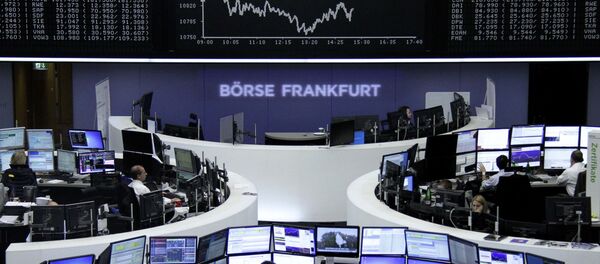According to a report by the London-based Markit Economics, the broader gauge of services and industrial production rose to 54.4 in November from 53.9 the previous month. Readings above 50 indicate expansion, while those below 50 suggest contraction.
Currently, overall economic activity in the Eurozone is at its best since May 2011. In a separate report, individual gauges for services and manufacturing both advanced as well, surpassing the previous expectations of them being flat.
The ECB head, Mario Draghi, recently noted that additional monetary stimulus might be necessary to spur inflation in the Eurozone. Production prices in the common currency area have been in negative territory for nine consecutive months. The Eurozone may therefore be facing a new economic phenomena: moderate economic growth coupled with persistent disinflation.
"This upbeat survey about the European economy fell short on one important aspect though: inflation," Bert Colijn of the Amsterdam-based ING Bank. "It is unlikely that the optimism from this survey will lead to less stimulus at their December meeting."
Factory input costs, the report said, hardly increased as international commodity prices hit their new 6-year low. Cheap commodities are among the main reasons causing rife disinflationary pressures in the common currency area.
As the US Fed are on their way to tightening monetary policy, to be followed shortly by the Bank of England (BoE), the ECB's initial intentions to add stimulus might be abandoned despite the disinflationary risks. The policy debate in Frankfurt is even shifting towards a possible downscaling of the existing $1.2 trln worth bond-buying programme. Anyways, the ECB policy makers will have to review their attitude on their nearest moves.
Germany's export-driven economy suffered a blow from the shrinking demand from mainland China and Brazil last month, however, setback in emerging markets was made up for by robust demand from rest of Europe. German unemployment is at its all-time low, while the weak euro supports the international competitiveness of the nation's exports.
Even though the global headwinds triggered a slowdown in the German economy in Q3, investor confidence picked up in November, suggesting a better Q4.
Simultaneously, the French economy cooled, with broader gauge of services and manufacturing having slumped to 51.3 in November from 52.6 the previous month. A rise in terrorist activity undermined the performance of services sector, weighing on the entire economy.
As the ECB in becoming increasingly uncertain of its further policy steps, most investors are confident the bond-buying programme will be expanded in order to stave off disinflation, even at the risk of creating asset bubbles. Consequently, investors' expectations pushed yields on most Eurozone bonds further into the negative, with the total amount of negative-yielding securities having topped $2 trln. Holders of the European debt have to pay for the right to do so, and while there is no sell-off in the Eurozone securities, investors must be absolutely confident of the common currency bloc's economy.


